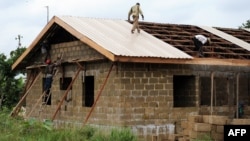YAOUNDE, CAMEROON —
Following a half-decade of preparations, Cameroon is assuming full control of the oil-rich peninsula of Bakassi, which has long been at the center of a territorial dispute with neighboring Nigeria. In keeping with a 2002 International Court of Justice ruling that ceded the territory to Yaounde, some 300,000 Nigerians living on the peninsula — approximately 90 percent of its population — must now obtain residence permits and be treated as foreign nationals living in Cameroon if they choose to stay after Wednesday's deadline.
Until now, all of the peninsula's inhabitants were given the option to assume Cameroonian citizenship or treated as foreigners should they decide to stay.
However, some peninsula residents claim a right to dual citizenship and say they shouldn't be forced to make such a decision.
"First of all I am born in Cameroon so I am an indigene of Cameroon," explained 27-year-old Daniel Labawa. "My parents are Nigerian and my mother from Benue State."
Although Bakassi has been experiencing changes since the Nigerian military and administration left in 2008, residents such as 36-year-old Nigerian businesswoman Janette Etta says Cameroon has yet to make its presence felt, neglecting even to circulate currency.
"We use Nigerian money," she said.
George Obi, 18, however, the change is palpable.
"Since Cameroon took charge, hospitals have come here," he said. "There were only mud houses here, but now we got a lot of fine houses. I love to be a Cameroonian."
"A lot has been done in Bakassi," said William Elangwe Etoe of Cameroon's Ministry of Labor, who works in Bakassi.
He said Yaounde has invested substantially in buildings for training centers.
"The first thing was to create two centers, one in Akwa and one in Isangele," he said.
While Cameroonian officials say they have worked hard to make people who want to live on the peninsula comfortable, some Nigerians still complain of harassment by Cameroonian soldiers, and two months ago a dispute between Nigerian businessmen and Cameroonian tax collectors forced local officials to impose a curfew throughout the region.
"We had recalcitrant taxpayers which led to a protest," said Bernard Okalia Bilai, governor of Cameroon's South West Region where Bakassi is located.
"Protesters went as far as attacking the mayor who orders the collection of the taxes," he added, explaining that the events led to arrests, and that soldiers were attempting to maintain law and order.
But Cameroonian soldiers have clashed with local resistance groups. In 2001, for example, 11 Cameroonian soldiers were declared missing and two dead in what was reported as a pirate attack. A group called the Bakassi Freedom fighters claimed responsibility — vowing that Bakassi will find no peace under Cameroon's rule. The group said it was protesting the 2002 International Court of Justice decision and the United Nations-supervised Green Tree agreement which gave Bakassi to Cameroon.
The legacy left by Nigeria in Bakassi is still strong. Nigeria has trained health workers and teachers who remain in the territory.
Portions of the area now officially under Cameroon's control are still in need of potable water and electricity.
Until now, all of the peninsula's inhabitants were given the option to assume Cameroonian citizenship or treated as foreigners should they decide to stay.
However, some peninsula residents claim a right to dual citizenship and say they shouldn't be forced to make such a decision.
"First of all I am born in Cameroon so I am an indigene of Cameroon," explained 27-year-old Daniel Labawa. "My parents are Nigerian and my mother from Benue State."
Although Bakassi has been experiencing changes since the Nigerian military and administration left in 2008, residents such as 36-year-old Nigerian businesswoman Janette Etta says Cameroon has yet to make its presence felt, neglecting even to circulate currency.
"We use Nigerian money," she said.
George Obi, 18, however, the change is palpable.
"Since Cameroon took charge, hospitals have come here," he said. "There were only mud houses here, but now we got a lot of fine houses. I love to be a Cameroonian."
"A lot has been done in Bakassi," said William Elangwe Etoe of Cameroon's Ministry of Labor, who works in Bakassi.
He said Yaounde has invested substantially in buildings for training centers.
"The first thing was to create two centers, one in Akwa and one in Isangele," he said.
While Cameroonian officials say they have worked hard to make people who want to live on the peninsula comfortable, some Nigerians still complain of harassment by Cameroonian soldiers, and two months ago a dispute between Nigerian businessmen and Cameroonian tax collectors forced local officials to impose a curfew throughout the region.
"We had recalcitrant taxpayers which led to a protest," said Bernard Okalia Bilai, governor of Cameroon's South West Region where Bakassi is located.
"Protesters went as far as attacking the mayor who orders the collection of the taxes," he added, explaining that the events led to arrests, and that soldiers were attempting to maintain law and order.
But Cameroonian soldiers have clashed with local resistance groups. In 2001, for example, 11 Cameroonian soldiers were declared missing and two dead in what was reported as a pirate attack. A group called the Bakassi Freedom fighters claimed responsibility — vowing that Bakassi will find no peace under Cameroon's rule. The group said it was protesting the 2002 International Court of Justice decision and the United Nations-supervised Green Tree agreement which gave Bakassi to Cameroon.
The legacy left by Nigeria in Bakassi is still strong. Nigeria has trained health workers and teachers who remain in the territory.
Portions of the area now officially under Cameroon's control are still in need of potable water and electricity.




